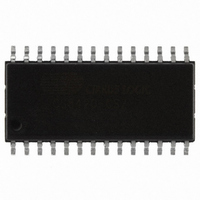CS8420-CSZ Cirrus Logic Inc, CS8420-CSZ Datasheet - Page 74

CS8420-CSZ
Manufacturer Part Number
CS8420-CSZ
Description
IC SAMPLE RATE CONVERTER 28SOIC
Manufacturer
Cirrus Logic Inc
Type
Sample Rate Converterr
Specifications of CS8420-CSZ
Package / Case
28-SOIC
Applications
CD-R, DAT, DVD, MD, VTR
Mounting Type
Surface Mount
Operating Supply Voltage
5 V
Operating Temperature Range
- 10 C to + 70 C
Mounting Style
SMD/SMT
Resolution
17 bit to 24 bit
Control Interface
3 Wire, Serial
Supply Voltage Range
4.75V To 5.25V
Audio Ic Case Style
SOIC
No. Of Pins
28
Bandwidth
20kHz
Rohs Compliant
Yes
Audio Control Type
Volume
Dc
0841
Lead Free Status / RoHS Status
Lead free / RoHS Compliant
For Use With
598-1782 - EVALUATION BOARD FOR CS8420
Lead Free Status / Rohs Status
Lead free / RoHS Compliant
Other names
598-1125-5
Available stocks
Company
Part Number
Manufacturer
Quantity
Price
Company:
Part Number:
CS8420-CSZ
Manufacturer:
CIRRUS
Quantity:
319
Company:
Part Number:
CS8420-CSZ
Manufacturer:
CIRRUS
Quantity:
9 908
Part Number:
CS8420-CSZ
Manufacturer:
CIRRUS
Quantity:
20 000
Company:
Part Number:
CS8420-CSZ/D1
Manufacturer:
CIRRUS
Quantity:
378
Company:
Part Number:
CS8420-CSZR
Manufacturer:
NICHICON
Quantity:
4 200
16.1.2 Reserving the first 5 bytes in the E
D to E buffer transfers periodically overwrite the
data stored in the E buffer. This can be a problem
for users who want to transmit certain channel sta-
tus settings which are different from the incoming
settings. In this case, the user would have to super-
impose his settings on the E buffer after every D to
E overwrite.
To avoid this problem, the CS8420 has the capabil-
ity of reserving the first 5 bytes of the E buffer for
user writes only. When this capability is in use, in-
ternal D to E buffer transfers will NOT affect the
first 5 bytes of the E buffer. Therefore, the user can
set values in these first 5 E bytes once, and the set-
tings will persist until the next user change. This
mode is enabled via the Channel Status Data Buffer
Control register.
16.1.3 Serial Copy Management System
In software mode, the CS8420 allows read/modi-
fy/write access to all the channel status bits. For
consumer mode SCMS compliance, the host mi-
crocontroller needs to read and manipulate the Cat-
egory Code, Copy bit and L bit appropriately.
In hardware mode, the SCMS protocol can be fol-
lowed by either using the COPY and ORIG input
pins, or by using the C bit serial input pin. These
options are documented in the hardware mode sec-
tion of this data sheet (starting on14 page 49)
16.1.4 Channel Status Data E Buffer
The E buffer is organized as 24 x 16-bit words. For
each word the MS Byte is the A channel data, and
the LS Byte is the B channel data (see Figure 39).
There are two methods of accessing this memory,
known as one byte mode and two byte mode. The
desired mode is selected via a control register bit.
74
buffer
(SCMS)
Access
16.1.5 One Byte mode
In many applications, the channel status blocks for
the A and B channels will be identical. In this situ-
ation, if the user reads a byte from one of the chan-
nel’s blocks, the corresponding byte for the other
channel will be the same. Similarly, if the user
wrote a byte to one channel’s block, it would be
necessary to write the same byte to the other block.
One byte mode takes advantage of the often identi-
cal nature of A and B channel status data.
When reading data in one byte mode, a single byte
is returned, which can be from channel A or B data,
depending on a register control bit. If a write is be-
ing done, the CS8420 expects a single byte to be in-
put to its control port. This byte will be written to
both the A and B locations in the addressed word.
One byte mode saves the user substantial control
port access time, as it effectively accesses 2 bytes
worth of information in 1 byte’s worth of access
time. If the control port’s auto-increment address-
ing is used in combination with this mode, multi-
byte accesses such as full-block reads or writes can
be done especially efficiently.
16.1.6 Two Byte mode
There are those applications in which the A and B
channel status blocks will not be the same, and the
user is interested in accessing both blocks. In these
situations, two byte mode should be used to access
the E buffer.
In this mode, a read will cause the CS8420 to out-
put two bytes from its control port. The first byte
out will represent the A channel status data, and the
2nd byte will represent the B channel status data.
Writing is similar, in that two bytes must now be
input to the CS8420’s control port. The A channel
status data is first, B channel status data second.
CS8420
DS245PP2



















